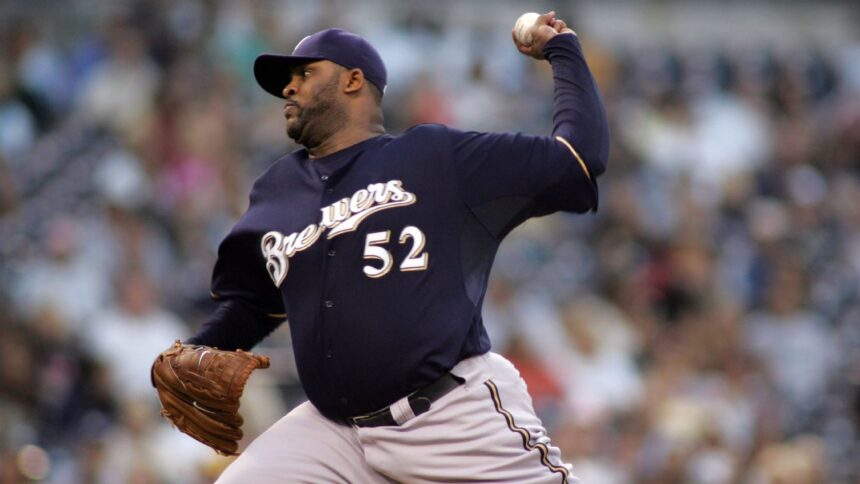Eugenio Suárez: The Player of the Moment and a Candidate for an Impactful Trade?
Eugenio Suárez, the third baseman for the Arizona Diamondbacks, has become the center of attention. With two home runs on Saturday, two on Sunday, and one more on Monday, he has a total of 36 home runs this season, tying Aaron Judge and Shohei Ohtani, and being only three behind Cal Raleigh. This stellar performance positions him as a strong contender for the league’s home run lead. In addition to his outstanding offensive production, Suárez could be the most valuable player available for a trade before the July 31st deadline. He currently holds the top spot on the list of the top 50 candidates to be transferred, according to Alofoke Deportes. Although the Diamondbacks are slightly below .500 and in the fight for a wild card spot, it is not clear if the team will let go of their powerful hitter. If a trade materializes, Suárez could become one of the most impactful acquisitions of the deadline, especially if he maintains this home run pace. In MLB history, only five players have been traded in the middle of a season with 40 or more home runs. This fact highlights the importance of Suarez in the trade market and raises the question: who have been the best acquisitions in the history of trade deadlines? To analyze the best acquisitions in history, we will focus on players who, like Suárez, were considered “rental players”, that is, they were about to become free agents at the end of the season in which they were transferred. This excludes players like Justin Verlander, Zack Greinke, and Juan Soto. We will also limit the analysis to players acquired in July.Below, we present a list of the most memorable acquisitions, starting with honorable mentions:
- Cesar Cedeno (1985, St. Louis Cardinals): The veteran outfielder batted .434 with 19 RBIs in 28 games, helping the Cardinals overtake the New York Mets in the National League East.
- Will Clark (2000, Cardinals): Batted .345/.426/.655 with 42 RBIs in 51 games… and then retired.
- Scott Rolen (2002, Cardinals): Drove in 44 runs in 55 games… and then signed an eight-year extension in September.
- Ugueth Urbina (2003, Florida Marlins) and Aroldis Chapman (2016, Chicago Cubs): Two key relievers who helped their teams win the World Series. Urbina had a 1.41 ERA for the Marlins, while Chapman recorded a 1.01 ERA and 16 saves for the Cubs (although he almost ruined Game 7 of the World Series).
- Carlos Beltran (2011, San Francisco Giants): Had a .920 OPS after arriving from the Mets, but the Giants didn’t make the playoffs… and gave up Zack Wheeler to get him.
- Marco Scutaro (2012, Giants): Batted .362 in 61 games (and .328 in the postseason, when the Giants won the World Series).
- J.A. Happ (2015, Pittsburgh Pirates): Proved that not all great acquisitions at the deadline are big stars. Happ went 7-2 with a 1.85 ERA in 11 starts.
- Ben Zobrist (2015, Kansas City Royals), Steve Pearce (2018, Boston Red Sox) and Jorge Soler (2021, Atlanta Braves): All three were very good in the regular season, but earned a place in their franchises’ history by winning the World Series Most Valuable Player award.
- Nick Castellanos (2019, Cubs): Had an impressive performance for Chicago (.321, 1.002 OPS, 37 extra-base hits in 51 games), but the rest of the team didn’t shine and the Cubs didn’t make the playoffs.
12. David Cone to the Toronto Blue Jays (1992) and then to the New York Yankees (1995)
The Transfers: The Mets sent Cone to the Blue Jays for Jeff Kent and Ryan Thompson; the Blue Jays sent Cone to the Yankees for three little-known players.
The statistics: 4-3, 2.55 ERA in 7 starts in 1992 (1.6 WAR); 9-2, 3.82 ERA in 13 starts in 1995 (2.6 WAR). David Cone transformed the trade deadline into a major event. The Blue Jays acquired him in 1992, and his arrival changed the landscape. Cone had a difficult start, but then recorded an ERA of 0.89 in his last six outings, helping the Jays win the division and the World Series. In 1995, the Yankees acquired him, and the team had an impressive run, with Cone winning nine of his 13 starts, allowing them to reach the playoffs for the first time since 1981. Cone helped the Yankees win four World Series in the following five years.11. Orlando Cabrera to the Boston Red Sox (2004)
The Trade: As part of a four-team trade, the Red Sox sent Nomar Garciaparra to the Cubs to acquire Cabrera from the Montreal Expos.The statistics: .294/.320/.465, 6 HR, 31 RBIs in 58 games (1.8 WAR). This trade had an impact beyond the statistics. The Red Sox were looking to change their culture and improve their defense, trading the popular Garciaparra. Cabrera provided the defensive improvement the Red Sox needed. The Red Sox were 56-46 on July 31 when they acquired Cabrera. They went 42-18 the rest of the season and won the World Series, breaking the curse.10. Yoenis Cespedes to the New York Mets (2015)
The trade: The Detroit Tigers sent Cespedes in exchange for Michael Fulmer and Luis Cessa.The statistics: .287/.337/.604, 17 HR, 44 RBIs in 57 games (2.0 WAR). The Mets initially agreed to acquire Carlos Gómez from the Milwaukee Brewers, but that trade did not materialize. Instead, they acquired Cespedes just before the deadline. The Mets were two games out of first place, and Cespedes provided power, energy, and many important hits, leading the team to a 37-22 record and winning the division. The Mets re-signed Cespedes in the offseason with a three-year, $75 million contract.9. Mark McGwire to the St. Louis Cardinals (1997)
The trade: The Athletics sent McGwire in exchange for Eric Ludwick, T.J. Mathews, and Blake Stein.The statistics: .253/.411/.684, 24 HR, 42 RBIs in 51 games (2.0 WAR). With McGwire’s five-year contract about to expire and the Athletics struggling, trade rumors followed him throughout the year. The Cardinals were seven games behind the Astros on July 31, but, although McGwire hit 24 home runs, the Cardinals performed poorly in the last two months. The biggest benefit of the trade came in the following seasons: McGwire signed a three-year extension in September and hit a record 70 home runs in 1998.8. Matt Holliday to the St. Louis Cardinals (2009)
The Trade: The Athletics sent Holliday in exchange for Brett Wallace, Clayton Mortensen, and Shane Peterson.
The statistics: .353/.419/.604, 13 HR, 55 RBIs in 63 games (2.3 WAR). Twelve years after McGwire’s transfer, the Athletics and the Cardinals made another big deal, and once again, the Cardinals came out on top. Holliday arrived at the Cardinals on July 24, when they had a slight lead of 1½ games in the National League Central Division. With Holliday and Albert Pujols, the Cardinals won the division title before losing to the Dodgers in the National League Championship Series.7. David Price to the Toronto Blue Jays (2015)
The trade: The Tigers sent Price in exchange for Daniel Norris, Matthew Boyd, and Jairo Labourt.
The statistics: 9-1, 2.30 ERA in 11 starts (2.6 WAR). The Blue Jays were tied for second place in the American League East, six games behind the Yankees, and also two games behind a wild card when they acquired Price on July 30. With Price and Josh Donaldson, the Jays won 11 straight games in early August and won the American League East title. Price then signed a record $217 million contract with Boston.6. Max Scherzer to Los Angeles Dodgers (2021)
The Trade: The Washington Nationals sent Scherzer and Trea Turner in exchange for Keibert Ruiz, Josiah Gray, and two other players.The statistics: 7-0, 1.98 ERA in 11 starts (2.8 WAR). The Dodgers, in a close competition in the National League West Division in 2021, made the most important trade of the deadline, acquiring Scherzer and Turner. Scherzer dominated in the final stretch, and the Dodgers won the 11 games he started, although they finished one game behind the Giants. The Dodgers won the National League Championship Series, but lost to the Braves in the World Series.5. Mark Teixeira to the Los Angeles Angels (2008)
The Trade: The Braves sent Teixeira in exchange for Casey Kotchman and Stephen Marek.The statistics: .358/.449/.632, 13 HR, 43 RBIs in 54 games (3.7 WAR). Teixeira was traded twice before becoming a free agent. In 2008, Teixeira gave the Angels everything they hoped for, helping them to a 100-win season, but they lost in four games to Boston in the American League Championship Series.4. J.D. Martinez to the Arizona Diamondbacks (2017)
The trade: The Tigers sent Martinez in exchange for Sergio Alcantara, Dawel Lugo, and Jose King.The statistics: .302/.366/.741, 29 HR, 65 RBIs in 62 games (2.4 WAR). The Tigers sent Martinez in July, and then Verlander in August. Martinez was dominant after the trade, averaging more than one RBI per game for the Diamondbacks. Arizona won the wild card game against Colorado, but the Dodgers swept the D-backs in the National League Championship Series.3. Randy Johnson to the Houston Astros (1998)
The trade: The Mariners sent Johnson in exchange for Freddy Garcia, Carlos Guillen, and John Halama.The statistics: 10-1, 1.28 ERA in 11 starts (4.3 WAR). Johnson was discouraged at the beginning of the 1998 season and had an ERA of 4.33 when the Mariners were out of contention. The trade was announced just after the deadline. Johnson performed incredibly during the following two months for the Astros. Johnson then signed with the Diamondbacks as a free agent.2. Manny Ramirez to the Los Angeles Dodgers (2008)
The Trade: As part of a three-team trade with the Red Sox and Pirates, the Dodgers sent Andy LaRoche and Bryan Morris for Ramirez.The statistics: .396/.489/.743, 17 HR, 53 RBIs in 53 games (3.5 WAR). Ramirez helped the Red Sox win the World Series in 2004 and 2007, but was eventually traded. He began a two-month romance in Los Angeles, where Ramirez dominated the National League. The Dodgers won the National League West Division by two games. Ramirez signed a two-year contract with the Dodgers, but his career went downhill after a 50-game suspension for a positive PED test.1. CC Sabathia to the Milwaukee Brewers (2008)
The trade: Cleveland sent Sabathia in exchange for Michael Brantley, Matt LaPorta, and two other players.The statistics: 11-2, 1.65 ERA, 7 CG, 3 SHO in 17 starts (4.9 WAR). Sabathia’s performance changed the course of the Milwaukee franchise. The Brewers hadn’t reached the postseason since 1982. Sabathia threw a complete game of 122 pitches to beat the Cubs 3-1, while the Mets lost. The Brewers lost in the National League Championship Series, but that playoff season changed the long-term course of the Brewers.









